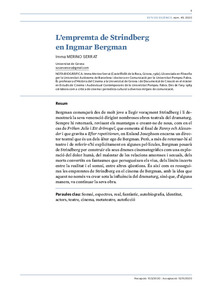L’empremta de Strindberg en Ingmar Bergman
Metadata
Show full item record
Estudis escènics: quaderns de l'Institut del Teatre. 2020, Núm. 45
Document typeArticle
Abstract
<p>Bergman començarà des de molt jove a llegir voraçment Strindberg i li demostrarà la seva veneració dirigint nombroses obres teatrals del dramaturg. Sempre hi retornarà, revisant els muntatges o creant-ne de nous, com en el cas de <em>Fröken Julie </em>i <em>Ett drömspel</em>, que esmenta al final de <em>Fanny och Alexander </em>i que gravita a <em>Efter repetitionen</em>, on Enland Josephson encarna un director teatral que és un dels àlter ego de Bergman. Però, a més de retornar-hi al teatre i de referir-s’hi explícitament en algunes pel·lícules, Bergman pouarà de Strindberg per construir els seus drames cinematogràfics com una exploració del dolor humà, del malestar de les relacions amoroses i sexuals, dels morts convertits en fantasmes que persegueixen els vius, dels límits incerts entre la realitat i el somni, entre altres qüestions. És així com es resseguiran les empremtes de Strindberg en el cinema de Bergman, amb la idea que aquest no només va crear sota la influència del dramaturg, sinó que, d’alguna manera, va continuar la seva obra.</p> <p>From an early age Bergman began reading Strindberg voraciously and showed his veneration for him by directing many of his plays, always returning to him, revising his productions or creating new ones, such as in the case of <em>Fröken Julie </em>and <em>Ett drömspel</em>, which he mentions at the end of <em>Fanny och Alexander </em>and is a gravitational force in <em>Efter repetitionen</em>, where Enland Josephson plays the role of a theatre director who is one of Bergman’s alter egos. However, along with returning to him in theatre and explicitly referring to him in some of his films, Bergman drew on Strindberg to build his film dramas as an exploration of human pain, the unrest of love and sexual relations, the dead turned into ghosts that pursue the living, and the uncertain boundaries between reality and dreams, among other issues. This is how Strindberg’s mark on Bergman’s film production will be explored, with the idea that he not only created under the playwright’s influence but that, to some extent, he continued his work.</p>
Access conditionsOpen Access
ISSN2385-362X
,
0212-3819
Collections
- 2020: Núm.: 45 [11]


